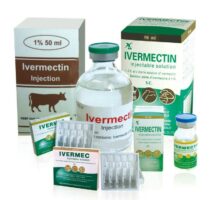Ivermectin is the widely used parasite treatment that many thought effective against the virus which caused the 2021-22 pandemic. You will recall it was called horse paste and users were mocked by the government, the media and the chattering classes. It turns out that it is much, much more than just a dewormer.
Ivermectin’s exploration in cancer treatment represents a fascinating intersection of repurposed drugs, where an established, safe drug with broad-spectrum anti-parasitic properties shows multifaceted potential against cancer through mechanisms like direct cytotoxicity, reversing drug resistance, and enhancing immune responses. While not yet a standard treatment, the interest and preliminary results suggest a pathway worth investigating further for its clinical applicability in oncology.
NIH PAPER – ABSTRACT:
Ivermectin has powerful antitumor effects, including the inhibition of proliferation, metastasis, and angiogenic activity, in a variety of cancer cells. This may be related to the regulation of multiple signaling pathways by ivermectin through PAK1 kinase. On the other hand, ivermectin promotes programmed cancer cell death, including apoptosis, autophagy and pyroptosis. Ivermectin induces apoptosis and autophagy is mutually regulated. Interestingly, ivermectin can also inhibit tumor stem cells and reverse multidrug resistance and exerts the optimal effect when used in combination with other chemotherapy drugs.

NEW ARTICLE: IVERMECTIN Tested against 28 types of Cancer – which cancers were most sensitive to Ivermectin? Which were least sensitive?
— William Makis MD (@MakisMD) August 26, 2024
A research group from Mexico investigated Ivermectin in Cancer
Paper: 2020 (Juarez et al) – Antitumor effects of ivermectin at clinically… pic.twitter.com/xWhgEBa1uv
GROK SUMMARY:
Ivermectin, originally celebrated for its effectiveness against parasitic infections, has been increasingly studied for its potential in cancer treatment, showing promise through various mechanisms:
- Direct Anti-Cancer Effects: Ivermectin can inhibit cancer cell growth by affecting multiple signaling pathways, notably through PAK1 kinase, which plays a role in cell proliferation, survival, and metastasis. It induces programmed cell death (apoptosis) and autophagy, a process where cells essentially digest themselves, which can lead to cancer cell death.
- Reversing Drug Resistance: Cancer cells often develop resistance to chemotherapy drugs, but ivermectin has been shown to reverse this resistance. It does this by binding to and inhibiting the activation of EGFR (Epidermal Growth Factor Receptor), which in turn affects downstream pathways like ERK/Akt/NF-κB, reducing the expression of P-glycoprotein, a protein that pumps chemotherapy drugs out of cancer cells.
- Immunomodulation: Ivermectin can convert “cold” tumors (those with low immune cell infiltration) into “hot” ones by inducing immunogenic cancer cell death (ICD). This process attracts immune cells to the tumor site, enhancing the body’s immune response against cancer cells. This property makes ivermectin a potential candidate for combination therapy with immune checkpoint inhibitors, like anti-PD1, showing synergistic effects in reducing tumor growth and even leading to complete responses in some preclinical models.
- Clinical Observations and Anecdotal Evidence: There have been reports and discussions on platforms like X (formerly Twitter) where individuals or medical professionals share experiences or studies suggesting that high doses of ivermectin, sometimes combined with other drugs like fenbendazole or mebendazole, might have beneficial effects against various cancers. These discussions often highlight the drug’s safety profile, comparing it favorably to common over-the-counter medications like Tylenol, and its historical impact on human health, akin to penicillin.
- Research and Development: While much of the evidence comes from preclinical studies or early-phase clinical research, there’s growing interest in exploring ivermectin’s role in cancer therapy. This includes its potential not just as a standalone treatment but in combination with existing cancer therapies to enhance efficacy or overcome resistance.
- Public and Scientific Interest: The discussion around ivermectin for cancer treatment spans from scientific journals to social media, reflecting both professional interest and public curiosity or hope. However, it’s crucial to approach such information with caution, understanding that while promising, much of the data requires further validation through rigorous clinical trials.
